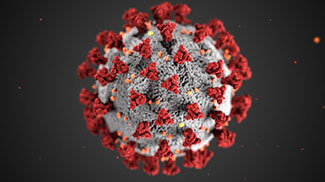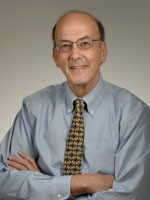COVID-19: working together as one to speed science
March / April 2020 | Volume 19, Number 2

Illustration by CDC/ Alissa Eckert, MS; Dan Higgins, MAMS
Opinion by Fogarty Director Dr Roger I Glass
I’m normally a glass-half-full kind of person. But these are not normal times. With an unprecedented pandemic sweeping the globe, it’s hard to stay optimistic.
And yet, people are coming together in beautiful ways to help each other. Scientists around the world are working furiously to better understand COVID-19, discover its secrets and unlock a cure. Research is proceeding at hyperspeed. Publications are pouring out as scientists share their initial analyses, theories and observations on how to address this killer virus. These may be just rough drafts of science, but they are being shared globally in an unprecedented manner, with little regard for whom will get credit or profit financially.
This is truly a moment for all to appreciate the importance of global health research, for we are in this together. By sharing data and pursuing the best ideas - from wherever they come - we may find a way to slow the spread of COVID-19 infection and reduce the number of deaths it claims.
While an effective vaccine would be the ideal solution, we are all asking, what can we do now? It’s frustrating when there are so many questions that we cannot answer. There are so many scientific problems to solve - things we don’t yet know about this lethal virus.
We initially thought older people were most at risk. But now we see it has also stricken down the young and healthy, destroying lungs, effectively turning them into useless wet sponges. We are learning that there may be huge numbers of people with the virus who have no symptoms. There also seem to be “super spreaders” who easily infect large numbers of people. We don’t yet know if those who recover from the virus have immunity and, if they do, how long that might last.
As a scientist, I am intrigued by these mysteries and have so many questions about how this virus operates. As a human being, I am devastated by the toll it is taking - the suffering, the lives cut short and the jobs that disappeared overnight.
For all of us, our personal circumstances are utterly transformed. I’m fortunate to be in isolation with my wife, who is equally engaged in battle against this virus. We have substituted frequent video conferences for the professional networking and social engagements we had taken for granted in our daily lives.
Although physically separated from colleagues and collaborators, I cannot remember a more productive work period than these last few weeks. It is gratifying to participate in the NIH response, under the able leadership of NIH Director Dr. Francis Collins. I am also full of admiration for my colleague, Dr. Tony Fauci, who as “America’s doctor” has been at the frontline of the U.S. response.
In record time, NIH scientists have banded together to process funding for promising COVID-19 research projects, develop vaccine candidates, establish numerous clinical trials, analyze reams of data, publish countless papers - all in the hopes of finding the magic bullet that will neutralize this dangerous adversary.
At Fogarty, we are concerned about how to reduce the impact on the world’s most vulnerable. How can we leverage our unique expertise in implementation science, bioethics, mobile health and stigma research? I am so proud of the Fogarty staff who have rallied to the cause, joining trans-NIH work groups to ensure the global perspective is considered.
Our team of epidemiologists has been working around the clock since the initial crowd-sourced data from China became available. They are also studying how South Korea responded and was able to quickly bend the curve. And they’re applying what they learned in compiling flu deaths to help determine the true mortality rate of COVID-19 in the U.S. They’re also providing training and support to colleagues in Africa, so they can do COVID-19 testing and genomic sequencing as the outbreak spreads across the continent.
Although these are uncertain times, we are united in our commitment to deploy science-based solutions to alleviate the suffering caused by COVID-19, especially among the world’s most vulnerable citizens.
More Information
- Coronavirus news, funding and resources for global health researchers from Fogarty
- Recent opinion pieces from Fogarty Director Dr. Roger I. Glass
To view Adobe PDF files, download current, free accessible plug-ins from Adobe's website .
































No hay comentarios:
Publicar un comentario